News
EXCLUSIVE INTERVIEW: ‘We’ll Never Bow to the West!’ Russian Ambassador to Uganda Tells UG Diplomat As He Discusses Ukraine, Africa’s Role, and Sanctions
Published
1 year agoon
By
Ugdiplomat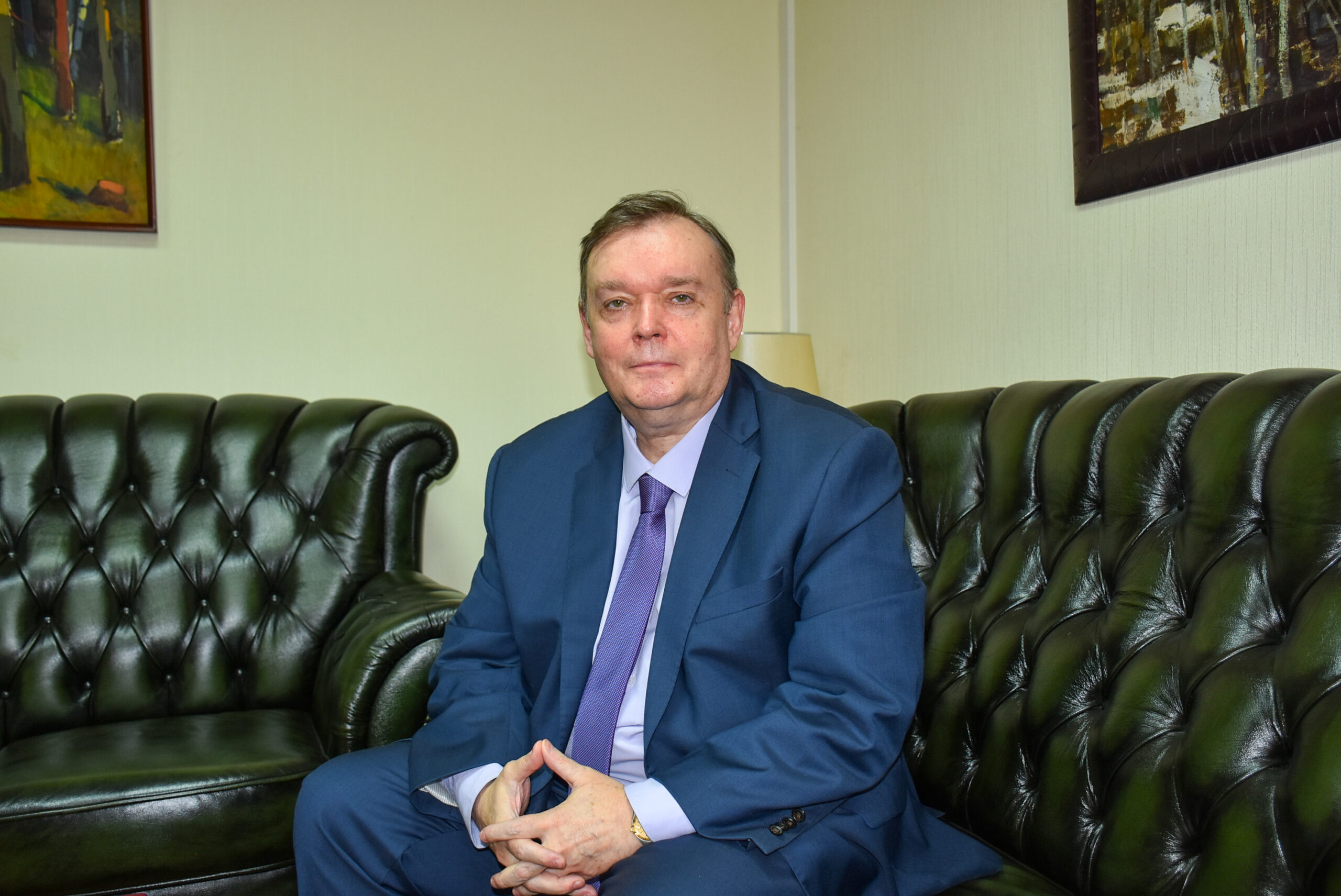
This week marks two years since Russian President Vladimir Putin sent troops to Ukraine in what he termed a military operation to deter, in his view, the country being used against Moscow.
In this first part of our interview with the Russian Ambassador to Uganda, H.E Vladlen Semivolos with UG Diplomat’s Alex Masereka, we discuss Russia’s military operation in Ukraine, Africa’s mediation process and why Moscow believes counting losses for the West is just a matter of time.
AM: Uganda and other African nations formed a team to try and play a mediation role in the Russia – Ukraine crisis, how does Moscow view the efforts by African leaders in this conflict? What happens to the proposals made by the leaders who feel that the conflict in Ukraine greatly affects the continent?
VS: We welcomed the mission of the heads of states and governments of the African countries to our country last June to engage in discussions with the leadership of the Russian Federation on ways to defuse the crisis in Ukraine. We highly appreciate the valuable instalment of Uganda represented by former Prime Minister Ruhakana Rugunda in organizing the visit. The mission revealed that our partners in Africa clearly understand the roots of the crisis inspired by the collective West.
Our country is attentively considering the proposals put forward by the African leaders. The ten principles they presented underscore global understanding of the need to resolve regional conflicts by negotiations, underline the strive of nations for peace on earth. Following the meeting, the parties adopted a communiqué on the humanitarian aspects of the current situation, including prisoner exchanges.
Russia acknowledges the significance of Africa’s role in fostering peace and stability and values the contribution of its leaders in pursuit of diplomatic solution to the crisis in Ukraine. The perspectives offered by African leaders are taken seriously, and we are actively engaged in dialogue to explore avenues for peaceful resolution.
Russia remains open to constructive dialogue with all nations, including those from the African continent and is committed to finding a solution to this complex and challenging situation. We appreciate the solidarity and efforts of the African leaders in contributing to this end.
However, it should be understood that the West, which is the major driver of the conflict is in no way interested in resolving this issue. The West has declared a war on us and it is not even hiding it. Their goal is to inflict a “strategic defeat” on Russia. Since they view Ukraine as a “defensive wall” in front of our country, they do not care about the huge losses of the lives of Ukrainians on the frontline. They are ready to sacrifice Ukraine for the sake of their geopolitical interests.
In Russia, we remember times when all of Europe united under Napoleon’s banners attacked us. The same happened during World War II when Adolf Hitler subordinated most of European nations to invade the Soviet Union. Everyone knows how it all ended. Unfortunately, the West did not learn this lesson. They forgot that we have a habit of finishing wars in the capitals of our enemies.
AM: What triggered President Putin’s bold move? As we mark the two-year anniversary of Russia’s ‘military operation’ in Ukraine, what urgent factors prompted the deployment of troops according to the Kremlin?
VS: Allow me to recall the events that brought about the current situation in Ukraine. They were yet another result of the divide-and-rule policy of the West aimed at setting countries at loggerheads and provoking interstate conflicts.
When the Americans and their satellites declared their victory in the Cold War, they adopted a policy of expanding NATO ignoring their own promises not to move it forward to our borders and not to deploy armed forces on the territory of the new members. These promises were made verbally and in writing to Soviet and later Russian leaders. All our proposals to negotiate the terms for peace and security that would benefit both Russia and Europe were rejected.
As of now, NATO is present on our borders in its full force. This is the reality. It is not us standing on their borders, it is them standing on our borders with nuclear weapons. It should be well understood.
After the anti-constitutional coup in Ukraine in 2014 that was orchestrated by the United States and its cronies, the new government that included the representatives of the far-right forces publicly professing NAZI ideology declared that their aim is to become a member of NATO. Then they launched a military operation against those who refused to accept the realities of the coup. We have witnessed the burning of 48 civilians by NAZIES in the House of Trade Unions in Odessa and aerial carpet-bombings of Lugansk and other cities in Donbass killing hundreds of civilians including women and children as well as many other crimes of the Kiev regime against humanity. In order to avoid such a development in their regions the Donbass declared independence.
In response the Kiev regime unleashed a bloody war on its former people indiscriminately shelling their cities and towns. In late 2021 – early 2022, the West started supplying Kiev with ammunition, anti-aircraft missile systems and other heavy weapons that were used against the residents of Donbass with growing intensity. This was the last red line; no more patience on our side was possible. The choice to start special military operation to defend Russians, to protect our country made by President Vladimir Putin was supported by the entire nation.
I have to remind here that for many years now, President Putin had been warning against the attempts to break the promise not to expand NATO to the east. We made it clear that any attempt to draw Ukraine into the alliance will end tragically, and that security guarantees have to be developed taking into account the interests of Ukraine, Russia and the European countries and ensure the security of that country without it becoming a NATO member.
I would like to underscore that this is not a war between Ukraine and us. Our people are the same; we have been living together for centuries, we have the same history, language, culture and traditions. We fought together during World War II defeating NAZI Germany. For centuries, there was only Russia on the world map; Ukrainian republic was established as part of the Soviet Union only as a result of the Socialist revolution of 1917.
Ukraine was chosen by the West to become our adversary for a variety of reasons. Let me name just some of them. Ukraine has the biggest population in this part of the world after Russia, it received huge amounts of armaments after the collapse of the Soviet Union, it has a great number of NAZI and anti-Russian entities, which have been sponsored by the collective West. The West is openly admitting now that they have been preparing Ukraine for war with us for years, training their military personnel, supplying military equipment etc., way before February 2022 when we started our special military operation.
The goal of the West is clear. They think that the time is ripe to accomplish their centuries-old intentions to dissolve, fragmentize Russia with a view to control and divide between themselves our vast natural resources. These plans are doomed.
AM: The West says Russia is preventing an independent Ukraine from pursuing her own path. Unveiling the Kremlin’s perspective on Ukraine’s sovereignty.
VS: Because of the policies of the leadership of Ukraine, the anti-government coup of 2014, this country, which inherited huge industrial and military potential from the Soviet Union, has become a poor territory, a sick man of Europe. The Kiev regime is a beggar. This country has no independence left whatsoever; the West is governing it on all levels.
Realizing its plans to deter Russia, bring NATO closer to our borders to pose a constant threat to our security, the West obliterated Ukraine. It became a failed state. It only serves the interests of the West to prolong the military conflict with hope that eventually it will weaken our country, exhaust our resources. Western instructors oversee the planning strategies of the Ukrainian General Staff, help with targeting the strikes on our territory, and directly participate in military actions. All this is being done to prevent Russia’s victory.
Today, the United States has united 54 countries to pump Ukraine with weapons and provide various military specialists to that country. In less than two years, the West has provided over $200 billion to Ukraine to support its military programme and to shore up the budget of this insolvent state. The EU, in particular, has allocated less than 80 billion euros to be disbursed within seven years for socioeconomic support to the Global South and the Global East. Of that amount, only 29.1 billion euros will go to Africa. Defeating Russia is a far more important task for Europe than to help Africa. Nevertheless, serving these goals Europe is acting against the interests of its own people. The failing economic indicators, continuous recession in most of the European states proves this quite well.
By the way, lately, seeing the Russian army’s progress in the Ukrainian theatre, the West changed its rhetoric to “not letting Vladimir Putin win” rather than winning themselves.
AM: Different approaches exist in the international sphere to resolve complaints, one being a dialogue. Has Russia tried that with the West?
VS: In the international fora, Russia has for years promoted dialogue as a tool to find practical solutions to various intergovernmental and regional problems, establish solid architecture of security and stability in the interests of the peace on earth. We are in favor of establishing a system of international relations based on the principles of sovereign equality, balance of interests and international law that would guarantee security, preservation of civilizational identity and opportunities for the development of all nations.
We tried to achieve understanding with our colleagues in the West with regard to creating a formula of security architecture in Europe that would serve the interests of all European nations, including Ukraine. Having witnessed five waves of NATO expansion, we introduced a number of initiatives aimed to achieve legally binding arrangements that would ensure European security. In response to our proposals, we received lies and blackmail, while the Alliance continued to expand despite our protests and legitimate concerns. NATO disregarded every our proposal to implement what we seemed to have agreed within the framework of Russia-NATO dialogue.
In November 2021, President Vladimir Putin tabled a number of new initiatives on European security. In December 2021, we made yet another attempt to reach agreement with the United States and its subordinates on the principles of European security and NATO’s non-expansion, and even drafted respective documents. They flatly refused by saying that they would not give us legally binding security guarantees.
Trying to substantiate this position, the West claims that NATO is a defensive alliance and that we should not be worried since nothing threatens our security. We have no reason to believe this. Recent history proves that in every part of the globe where the United States and NATO inculcate their understanding of democracy, the result is blood, suffering, spread of terrorism and extremism.
Nevertheless, as Russian Foreign Minister Sergey Lavrov recently indicated, we remain open to a political and diplomatic settlement of the crisis in Ukraine based on our legitimate interests and the developments of the past years that have led to the present situation. Given the lack of serious proposals from those who declared war on us, and their unwillingness to consider our interests or the realities on the ground, reaching an agreement at the negotiating table remains unlikely.
AM: The West is not only using war in Ukraine on you but also employing tools like sanctions on Russia. Will Moscow sustain its operation with sanctions?
VS: We have been living under the sanctions of the West for more than a century now, since 1922. The West does not understand that sanctions will never make us bow to them. That is the reason they hate us and fear us that much.
The imposition of sanctions is driven mostly by geopolitical considerations, and while these measures may bring about economic challenges, they have only strengthened our resolve as a nation. Russia’s vast resources and wealth has become a point of envy for the West, who would undoubtedly wish to access and utilize these resources to meet their own economic needs. However, it is important to emphasize that Russia remains steadfast in protecting its sovereignty and ensuring that its resources are managed in the best interests of its people.
We know that the sanctions drive is going to continue, that the West would try to intimidate us with even more of them. The latest waves of sanctions were unprecedented. As President Vladimir Putin once mentioned, we are now the champions in the number of sanctions introduced against a single country. Their objective is strategic – to marginalize and isolate Russia, to contain Russia, to hamper Russia’s development and to reduce to a zero level Russia’s role in world politics, economy, trade, sports, art, science and education.
In essence, while sanctions may be a challenge, Russia stands firm in its determination to chart its own course and protect its wealth for the benefit of its people.
AM: Last year, economic statistics showed Russia’s economy was flourishing despite the sanctions. What is the silver bullet?
VS: In a way, sanctions made us stronger. According to statistics of the World Bank, last year we became the fifth world economy. In the wake of sanctions, the Russian government elaborated the measures that helped our economy to adjust to the new situation. We are expanding trade with friends and reliable partners and open new markets. Restrictions imposed on our country enabled us to become the major supplier of grain to the world, almost completely abandon the import of meat, fruits and vegetables from Europe. We became self-sufficient in many areas.
The fact that the West stole our foreign reserves taught us a very important lesson. From now on, we will never trust the Americans or the Europeans. We will rely only on ourselves and on our allies. We have many friends in Africa, Asia and Latin America that constitute the overwhelming majority of civilizations on this planet. We will not be left alone or isolated. The world is not limited to the collective West.
AM: Has President Putin set a timeline on when his goals in Ukraine will be achieved?
VS: There is no specific framework for the operation. The crisis in Ukraine could have finished long time ago, but the West made a bid on warmongering. On December 7, 2023 Secretary of State Antony Blinken described supporting Ukraine as a lucrative investment in the US economy, saying that “90 percent of the security assistance that we provided to Ukraine has been spent here in the United States, benefiting American businesses, workers, communities, strengthening our nation’s defense industrial base.”
On our part, as stated by Minister of Foreign Affairs of Russia Sergey Lavrov, we are guided by a belief that the security of our state, including that of the population of the new Russian regions, the life, honor, dignity, rights and interests of our citizens will be reliably ensured, and all the goals of the special military operation will be achieved.
In the next part of our interview, Russian Ambassador discusses Russia – Uganda relations and Moscow’s presence in Africa
You may like
-


Winners and Losers in Hajjat Namyalo Reappointment: Stroke Of Genius in Museveni 2026 Gameplan
-
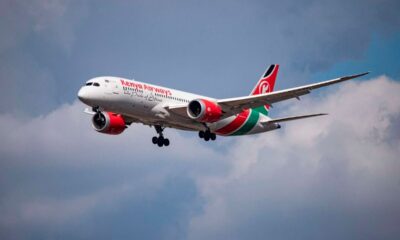

Kenya Airways Flight Diverts to Entebbe After Onboard Medical Emergency Turns Fatal
-
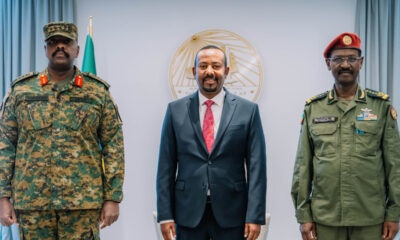

Gen Muhoozi Hails Uganda-Ethiopia Defence Ties
-
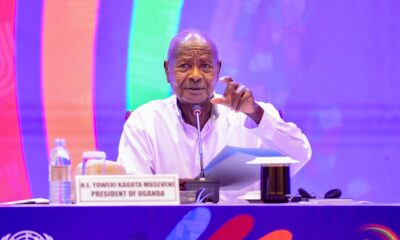

“Dear Sirs and Madams,” Museveni Bashes Opposition Hypocrisy, Cites U.S. Congressman on Foreign Funding and LGBT Grants
-
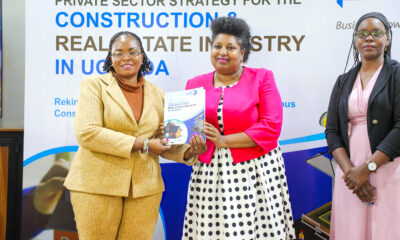

Namuganza Urges Real Estate Developers to Prioritize Quality and Fiscal Planning in Uganda’s Housing Sector
-
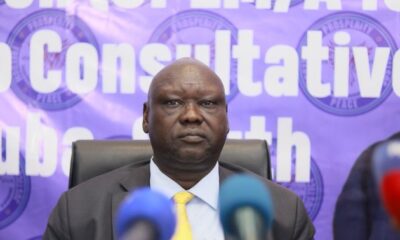

COUP: Machar ‘Ousted’ As South Sudan Minister Appoints Self SPLM-IO Chief
